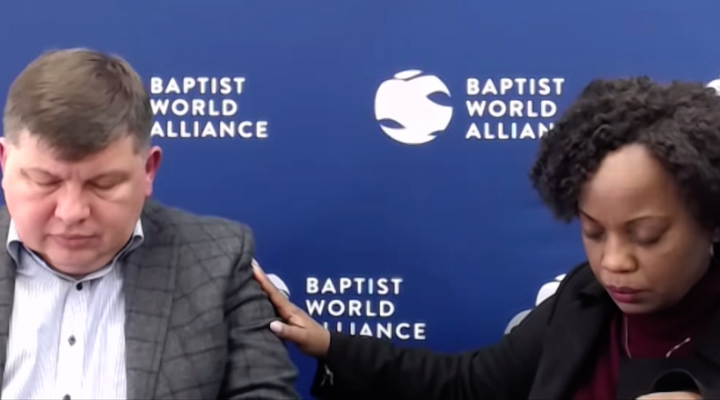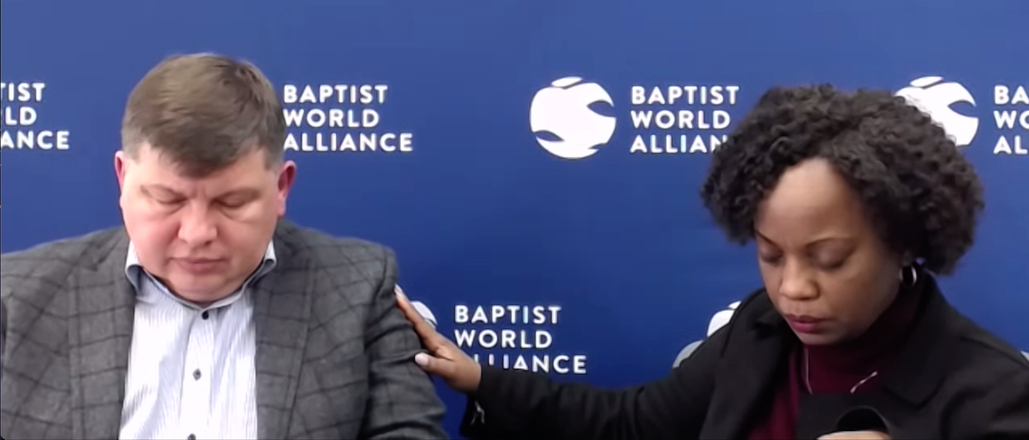Ukrainian pastors have radically adjusted their ministries to meet the physical and spiritual needs of church members and countrymen since Russian forces invaded Ukraine almost a year ago.
So says Igor Bandura, a pastor and vice president of the All-Ukrainian Union of Evangelical Christian-Baptists, speaking during a Feb. 2 webinar hosted by the Baptist World Alliance.
“In this huge challenge we cannot just preach like we did before the war,” he said. “It is very, very challenging and it is a huge burden every single Sunday. And this is why we depend on, and need, the power of the Holy Spirit as never before.”

Igor Bandura
Bandura visited BWA headquarters in Falls Church, Va., Feb. 2 to huddle with supporters of the union’s efforts to be a source of strength for overwhelmed Baptist congregations and clergy in a war that has displaced millions of Ukrainians and sent at least 8 million fleeing abroad.
During the visit, BWAid Director Marsha Scipio moderated a Zoom webinar featuring Bandura titled, “Special Global Briefing: State of the Ukrainian War and the Baptist Church.”
Scipio’s questions, along with some from the virtual audience, ranged from the physical condition of church buildings to ways the war has altered the makeup and needs of Baptist congregations in Ukraine.
Scipio asked about the spiritual, emotional and physical condition of pastors who have remained in the war-torn country.
“Our pastors are really tired,” Bandura replied. “You can see this when you speak with them and when you look at their eyes. They are faithful, but they do much more than they did before the war to help people every day.”
The ministers routinely report getting too little to eat and too little sleep as their facilities — or what’s left of them — host internally displaced Ukrainians and serve as aid stations for the wider community, he said.
In response, the union has launched get-aways for pastors and their wives, he explained. “They are more like retreats. We bring pastors and their wives in for two or three days and just let them rest, and we minister to them with the word of God. Then they go back and continue their ministries.”
The union also has been assisting ministers and their families from the nearly 300 Baptist churches that have been destroyed or exist in areas controlled by Russian forces. Many of those displaced clergy who escaped those regions have insisted on ministering to others in need, Bandura said. “We would like to support them because we would like to keep them in their callings and in their ministry. For us it is very, very important.”
Most churches have seen half or more of their congregations flee their homes and communities.
Even in areas not occupied by Russia, most churches have seen half or more of their congregations flee their homes and communities, leaving pastors to serve the remnants plus the influx of Ukrainians who previously didn’t belong to a parish, Bandura said. “So, you have your congregation going through all these troubles with others who are still unbelievers.”
Many of the newcomers to Ukrainian churches are simply in search of food and other supplies, he said. “Anxious people, they go to churches because they can find support and help there.”
But other visitors are staying for fellowship and asking for spiritual support, he added. “We see how God is working. Not everybody comes to the church only because they get (aid). Of course, there are such people, but we see men and women who are really open to the church world, to the Bible and to the meaning of prayer.”
Their presence also has influenced the nature and content of sermons, which are “more simple, but at the same time they have to be more gospel-centered for people who are just trying to understand who Christ is, what he’s doing. It is very contextual because people would like to find Christ in the midst of their terrible situation.”
“People would like to find Christ in the midst of their terrible situation.”
The situation in Ukraine is difficult but hopeful, Bandura said. “Few people on this planet believed that Ukraine would survive more than three or four days, but we are still alive and we are fighting and with great courage and hope as we are waiting” for the war to end.
But Russia has continued to conduct missile attacks against Ukraine’s infrastructure, as reports suggest another major ground offensive may be imminent. “We know that every day our soldiers are being killed and almost every day we hear civilians are being killed or injured. There is a lot of suffering, but the spirit of the nation is strong,” Bandura said.
With help from partners like the European Baptist Federation and BWA, the Ukrainian Baptist Union is pursuing additional ways to meet the physical and spiritual needs of the battered country.
“Now we are building mobile kitchens to send to areas where people cannot prepare a meal for themselves, and we are preparing teams we hope to send out with 10 mobile kitchens,” he said. “The teams will provide hot meals to 200 to 300 people per day.”
Baptist churches in Ukraine not occupied by Russian troops will continue to house refugees fleeing west and provide meals, generators, firewood and financial, spiritual and emotional support for those remaining behind, he said.
Discussions also are underway to create a network of Ukrainian Baptist churches across the European Union, Bandura said. “We realize that many people will not come back.”
These efforts and continued fundraising are designed to make Baptist churches beacons of hope in and around Ukraine, he declared. “The idea is to help churches to become these places where not only Christians but people from the community can come and have one place maybe to eat, to have tea, maybe recharge their telephones and of course to find home.”
Churches in the U.S. and elsewhere can help with that effort, he added. “The most powerful weapon, the spiritual weapon, is our prayer. It is not limited by miles. It doesn’t matter where you are. And when we unite our prayers, we really stand against the evil one.”
Related articles:
Russia’s attacks on Ukrainian religious sites are war crimes


